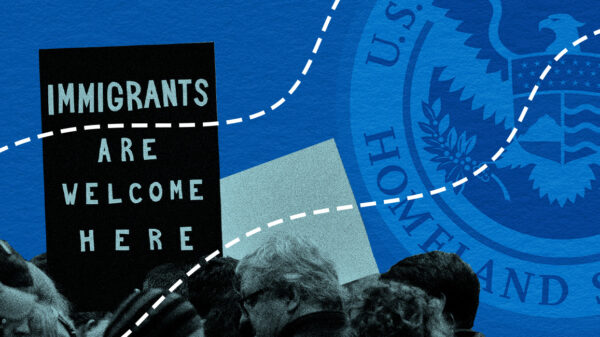The ACLU of Maine, the Refugee and Human Rights Clinic (“RHRC”) at the University of Maine School of Law, and the Immigrant Legal Advocacy Project (“ILAP”) have filed a Freedom of Information (“FOIA”) lawsuit against the United States Citizenship and Immigration Services (USCIS), seeking to compel the agency’s Boston Sub-Office and Newark Asylum Office to release information about how they assess asylum requests.
The ACLU of Maine, in collaboration with the RHRC and ILAP, first filed the FOIA request in July 2019, after immigration advocates at the RHRC and ILAP witnessed a marked decrease in asylum approvals from the USCIS Boston Sub-Office, especially for asylum seekers from central African countries. According to the initial FOIA request, since 2016, the Boston Sub-Office has increasingly been referring asylum seekers to lengthy immigration court proceedings, delaying work permits and family reunification.
According to the complaint filed today, the Boston Sub-Office approved eight percent of asylum seekers, considerably lower than the 30 percent national average. Many of the asylum applicants who are referred or denied by the USCIS Boston Sub-Office are later granted asylum by the courts.
“We are worried that the stories we are hearing from asylum seekers and immigration attorneys suggest that these USCIS offices are discriminating against asylum seekers from central African countries,” said Emma Bond, legal director at the ACLU of Maine. “There is no way of knowing this for sure unless USCIS complies with its obligations under federal law to release documents about its policies, procedures, and demographic information about asylum seekers.”
“The disparity in asylum approval rates between the Boston Sub-Office and the national average is of great concern and requires an explanation from the agency,” said Anna Welch, director of the Refugee and Human Rights Clinic at the University of Maine School of Law. “Referring asylum seekers to lengthy immigration proceedings, which the majority of asylum seekers end up winning, puts their lives on hold for years. Many are unable to work, unable to be reunified with their families, and unable to start their lives in the United States. The COVID pandemic has only exacerbated these delays.”
“In immigration court, individuals fleeing persecution must defend themselves against the government’s attempt to deport them, whereas an asylum interview at an asylum office is non-adversarial,” said Julia Brown, advocacy and outreach director at the Immigrant Legal Advocacy Project. “By referring almost all asylum cases to immigration court, the Boston Sub-Office is forcing traumatized survivors of violence to navigate, often without an attorney, the complex and unfamiliar procedures of our immigration court system. This puts unrepresented asylum seekers at further disadvantage as well, because they are far less likely to prevail in front of an immigration judge than their represented counterparts.”
###
ACLU of Maine
The ACLU of Maine’s mission is to realize this promise of the United States Constitution for all Mainers and expand the reach of its guarantees. Our priorities include racial justice, immigrants’ rights, criminal legal reform, free speech, privacy and voting rights.
The Refugee and Human Rights Clinic at the University of Maine School of Law
The Refugee and Human Rights Clinic (RHRC) is a program within the Cumberland Legal Aid Clinic at the University of Maine School of Law. Law students serve as the attorneys, working under the close supervision of Sam L. Cohen Professor Anna Welch, assisting low-income immigrants through a broad range of cases and projects. The course targets a critical gap in access to justice – providing direct legal representation and broader advocacy to immigrants and refugees seeking political asylum and similar protections under federal law, while training future attorneys on how to best serve the legal needs of immigrants.
Immigrant Legal Advocacy Project
The Immigrant Legal Advocacy Project helps low-income immigrants improve their legal status and works for more just and humane laws and policies affecting immigrants.
Related Content

Report: Boston Asylum Office Violates Rights of Asylum Seekers
Stay Informed
Sign up to be the first to hear about how to take action.
By completing this form, I agree to receive occasional emails per the terms of the ACLU’s privacy statement.
By completing this form, I agree to receive occasional emails per the terms of the ACLU’s privacy statement.

